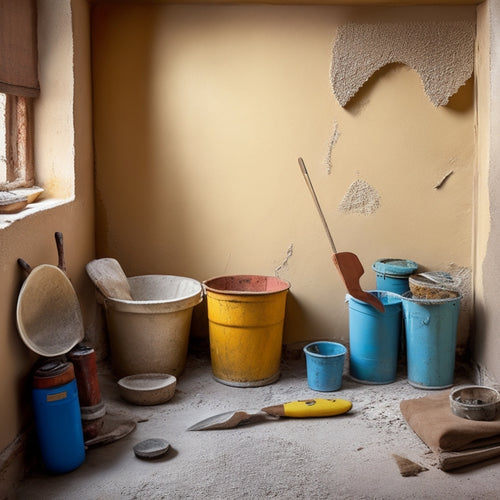
Top Brands for Mixing Premixed DIY Renovation Needs
Share
As you take on your DIY renovation project, you'll need reliable mixing equipment to get the job done. For concrete mixing, top brands like DeWalt, Bosch, and Makita offer high-performance and robust solutions. For smaller projects, compact mixers from these brands provide versatility and convenience. If you're tackling a large job, gas-powered mixers deliver sustained power and high gas efficiency. For ease of use, electric mixers with ergonomic handles and variable speed controls are a great option. Whatever your project needs, exploring these top brands and mixer types will help you find the perfect fit, and discovering their unique features will take your project to the next level.
Key Takeaways
• DeWalt, Bosch, and Makita are top brands for reliable and high-performance concrete mixers suitable for DIY renovation needs.
• For small projects, compact and lightweight mixers from brands like Makita and Bosch provide versatility and convenience.
• Electric mixers from brands like DeWalt and Makita offer ease of use, variable speed control, and certifications like UL and ETL for safety standards.
• Gas-powered mixers from brands like DeWalt and Bosch provide sustained power for heavy-duty tasks and high gas efficiency.
• When choosing a mixer brand, consider factors like drum material, mixing technique, and safety features to ensure optimal performance and project outcomes.
Top Concrete Mixer Brands to Consider
When tackling a DIY renovation project, selecting the right concrete mixer brand is vital, as it directly impacts the quality and efficiency of your work. Top brands like DeWalt, Bosch, and Makita are worth considering for their reliability and performance. These brands offer high-quality mixers that can handle demanding projects, guaranteeing you get the best results.
However, it's important to remember that even the best mixer can malfunction if not properly maintained. To avoid this, follow mixer maintenance tips such as regularly cleaning the mixer, lubricating moving parts, and checking for wear and tear on the drum and blades.
Additionally, always adhere to mixer safety guidelines, including wearing protective gear, maintaining a stable work environment, and avoiding overloading the mixer. By doing so, you'll not only extend the lifespan of your mixer but also promote a safe working environment.
Best Mixers for Small Projects
When tackling small DIY projects, you'll want to choose a mixer that's tailored to your needs.
You're likely looking for compact mixing options that won't take up too much space, while still providing the power you need to get the job done.
That's why you'll want to contemplate powerful small batch mixers that can handle smaller quantities with ease.
Compact Mixing Options
For small-scale DIY renovation projects, you'll need a mixer that's compact, lightweight, and powerful enough to handle small batches of materials, making portable mixers an ideal choice. These portable mixing solutions are designed to provide you with versatility and convenience, allowing you to work on small projects without the hassle of lugging around a bulky mixer.
Look for mixers that are ergonomically designed, with comfortable grips and balanced weight distribution, making them easy to maneuver and reducing fatigue.
When selecting a compact mixer, consider the type of materials you'll be working with and the size of your projects. A versatile mixing tool should be able to handle a variety of materials, from thin mixes to thick compounds.
Additionally, look for features such as variable speed controls, which enable you to adjust the mixing speed to suit your specific needs. With the right compact mixer, you'll be able to tackle small projects with ease and confidence, knowing that you have a reliable and efficient tool by your side.
Powerful Small Batch Mixers
Your search for the perfect mixer for small projects ends with powerful small batch mixers that can handle everything from epoxy to plaster, delivering professional results in compact batches.
These mixers are designed to tackle smaller-scale projects, making them ideal for DIY enthusiasts and professionals alike. With their compact size and powerful motors, you can achieve smooth, consistent mixes every time.
When working with powerful small batch mixers, it's important to prioritize mixer safety precautions. Always read the instruction manual, wear protective gear, and verify a stable working environment.
Additionally, follow mixer maintenance tips to extend the lifespan of your mixer. Regularly clean the mixing drum and blades, and store the mixer in a dry, clean area.
Heavy-Duty Mixers for Large Jobs
When you're tackling a large-scale renovation project, you need a mixer that can keep up with your demands.
You'll require a heavy-duty mixer that features a high-capacity mixing drum to handle large batches of material, and an industrial-grade motor that can provide the necessary power to mix thick, heavy materials.
High-Capacity Mixing Drums
You'll need high-capacity mixing drums that can handle large volumes of material when tackling extensive renovation projects or commercial applications. These drums are designed to withstand heavy use and minimize downtime, guaranteeing your project stays on track.
When selecting a high-capacity mixing drum, consider the drum materials and mixing techniques that best suit your project needs. Here's a comparison of some popular options:
| Drum Material | Mixing Technique |
|---|---|
| Steel | Dual-shaft mixing for high-volume, high-viscosity materials |
| Fiberglass | Spiral mixing for efficient blending of dry materials |
| Polyethylene | Paddle mixing for gentle handling of sensitive materials |
| Stainless Steel | Planetary mixing for high-shear mixing of complex materials |
When working with large volumes of material, safety is paramount. Confirm your mixing drum is designed with safety features such as secure lid fastening, ergonomic handles, and a stable base to prevent accidents. By choosing the right high-capacity mixing drum for your project, you'll be able to work efficiently and safely, achieving professional-grade results.
Industrial-Grade Motor Power
Complementing your high-capacity mixing drum, industrial-grade motor power is necessary to efficiently process large volumes of material, guaranteeing your heavy-duty mixers can handle even the most demanding renovation projects.
When choosing a motor, you'll want to prioritize motor efficiency to minimize energy waste and reduce your equipment's overall operating cost. Look for motors with high torque ratings, as they'll provide the necessary power to tackle thick, heavy mixes without overheating or stalling.
A reliable motor will also reduce the risk of accidents caused by equipment failure. You'll want to evaluate the motor's horsepower, amperage, and voltage ratings to verify they're compatible with your mixing drum and the materials you're working with.
Additionally, opt for motors with built-in safety features, such as thermal overload protection and emergency stop functions. By selecting an industrial-grade motor that meets your specific needs, you'll be able to tackle large-scale renovation projects with confidence and peace of mind.
Electric Mixers for Ease of Use
Frequently, DIY renovators turn to electric mixers as a reliable solution for streamlining their projects and minimizing manual labor.
When choosing an electric mixer, you'll want to prioritize electric mixer safety and user-friendly features. Look for mixers with ergonomic handles and non-slip grips to reduce fatigue and prevent accidents. A comfortable mixer is one that allows you to work efficiently without straining your back or hands.
You'll also appreciate features like variable speed control, which lets you adjust the mixing speed to suit your specific project needs. Some electric mixers come with built-in timers, allowing you to set a specific mixing time and avoid over-mixing. Others may have multiple mixing paddles or beaters, making it easy to switch between different mixing tasks.
As you explore electric mixer options, keep an eye out for certifications like UL (Underwriters Laboratories) or ETL (Intertek), which guarantee the mixer meets strict safety standards.
Gas-Powered Mixers for Tough Tasks
When tackling heavy-duty mixing tasks that require sustained power and high torque, gas-powered mixers become the go-to solution for DIY renovators. You'll appreciate the extra oomph these machines provide, especially when working with thick, heavy materials like concrete or plaster.
Look for gas-powered mixers with high gas efficiency to minimize fuel consumption and reduce emissions. This won't only save you money but also contribute to a more environmentally friendly renovation process.
To guarantee your gas-powered mixer runs smoothly and safely, regular maintenance is essential. Always follow the manufacturer's instructions for maintenance and repair.
Check the air filter, spark plug, and fuel tank regularly to prevent clogs and guarantee proper combustion. Additionally, make sure to store your mixer in a well-ventilated area, away from flammable materials.
Budget-Friendly Mixer Options
For DIY renovators on a tight budget, opting for a manual or electric mixer can be a cost-effective alternative to gas-powered mixers, allowing you to complete smaller to medium-sized projects without breaking the bank. These affordable mixer alternatives are perfect for tasks that don't require heavy-duty mixing, such as mixing small batches of mortar or concrete for repairs.
When it comes to budget mixing accessories, you can find a range of affordable options that won't compromise on quality. Look for mixers with durable construction, comfortable grips, and adjustable speeds to guarantee you get the right consistency for your project.
Electric mixers are a great choice for smaller projects, as they're lightweight, easy to use, and require minimal maintenance. Manual mixers, on the other hand, are perfect for those who prefer a more hands-on approach or need to mix in tight spaces.
Frequently Asked Questions
What Safety Precautions Should I Take When Using a Concrete Mixer?
When operating a concrete mixer, you must prioritize safety to avoid accidents.
First, wear personal protective equipment like gloves, safety glasses, and a dust mask to shield yourself from flying debris and dust.
Guarantee mixer operation safety by reading the manual, understanding the mixing process, and following the manufacturer's guidelines.
Always maintain a safe distance from the mixer while it's in use, and never leave it unattended.
Can I Mix Other Materials Besides Concrete With These Mixers?
You're wondering if you're limited to mixing concrete with your trusty mixer. Hold on to your hard hat, because the answer is no!
You can venture into mixing alternative materials, like mortar, plaster, or even asphalt. But, be aware that different mixing techniques are required for each material.
Don't worry, with the right guidance, you'll be a pro in no time. Just remember to adjust your mixing speed, angle, and tool attachments accordingly to guarantee a smooth, safe, and successful mixing experience.
How Do I Properly Clean and Maintain My Concrete Mixer?
When it comes to cleaning and maintaining your concrete mixer, you'll want to prioritize safety and efficiency.
Start by turning off the mixer and letting it cool down completely.
Then, use a wire brush to remove any dried concrete residue.
Next, mix a solution of water and mild detergent, and use a soft-bristled brush to scrub the interior and exterior surfaces.
Finally, rinse thoroughly and dry with a clean towel to prevent rust.
Regular cleaning and maintenance will extend the life of your mixer and guarantee safe operation.
What Is the Ideal Mixer Size for My Specific Renovation Project?
When determining the ideal mixer size for your specific renovation project, you'll want to evaluate the mixer capacity and project scale.
You're looking for a mixer that can handle the volume of concrete needed for your project without overloading it.
A mixer that's too small will lead to multiple batches, increasing the risk of inconsistencies and safety hazards.
On the other hand, a mixer that's too large will waste resources and be a hassle to maneuver.
Are There Any Specific Regulations for Using Mixers in Residential Areas?
Did you know that over 40% of DIY renovators have faced issues with local authorities due to mixer usage?
When it comes to using mixers in residential areas, you'll want to guarantee you're complying with local zoning laws and noise regulations.
Check with your local government to determine specific restrictions on mixer usage, noise levels, and operating hours to avoid fines or project delays.
Don't risk it – research and plan ahead to guarantee a smooth renovation process.
Conclusion
As you put the finishing touches on your DIY renovation, you're probably feeling like a modern-day Renaissance master, having conquered the chaos of concrete mixing.
With the right tools, you've tamed the beast, and your space is now a symbol of your handiwork.
Remember, a good mixer is like a trusty steed - it'll carry you through the toughest of projects.
Choose wisely, and you'll be sipping martinis in your newly renovated pad, basking in the glory of a job well done.
Related Posts
-

5 Must-Have Plastering Tools for Safe Renovation
You'll need a range of essential tools to tackle your plastering project safely. Invest in a variety of trowels, incl...
-

Streamline Your Exterior Renovation Timeline
To streamline your exterior renovation timeline, you'll need to approach the process strategically. Start by planning...
-

Stucco Patching Material Checklist for Home Renovation
You'll need a range of essential tools, including a putty knife, wire brush, hawk or flat trowel, level, and straight...


